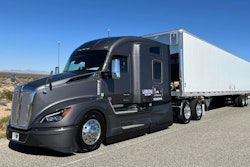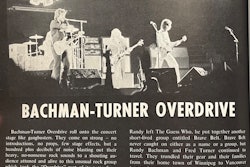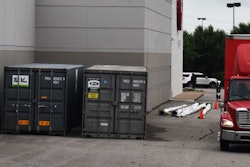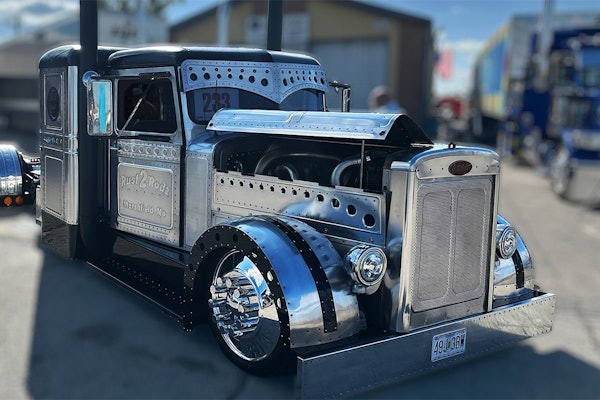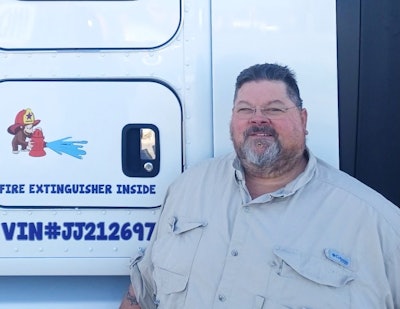
I’ve known Matthew Mickenberg for several years. He is connected to a small peer group of truck and small fleet owners who’ve come together to support each other both professionally and personally. And he’s no stranger to sudden changes life and business can throw at you. Mickenberg is a cancer survivor, and one of the most calm truck owners I’ve ever known. That experience with a potentially deadly disease tested that calm nature, certainly, after he made what he describes in retrospect as possibly the worst decision of his life -- a move to cancel his health insurance.
The decision yielded more than $70,000 gone from his savings account before he was able to re-purchase health insurance. Yet, crucially, he learned from the experience.
[Related: How to recognize the high business risk of failing health]
 Matthew Mickenberg pictured with his wife, Karen
Matthew Mickenberg pictured with his wife, Karen

In February, a consequential day approached: He would be making the final payment on the note for the rig. The timing felt good to launch Phase 2 -- to trade into another new truck, following the same plan for the next one.
Mickenberg’s past experiences set up expectations for how negotiations would play out. Contacting a dealership he had used previously, he learned the inventory was much better than anticipated, with 20-plus new owner-operator-spec’d tractors available. Other owners had put money down on these to order, but they were “No Take” sales – the prospective owners had pulled out of the deal.
Learning this certainly could make a buyer think they were in a stronger position for negotiating a better-than-anticipated purchase price. Yet Mickenberg was about to be surprised. Even so, when considering big investments like the purchase of a truck, it can be difficult to disengage the cruise control toward the finale and tap the brakes. The excitement of taking delivery of a new truck and the many compliments and congratulations people will send pumps up our optimism.
The opening offer Matthew received wasn’t an automatic deal killer, yet the interest rate and the amount of the monthly payment raised big concerns in his mind about fixed costs, and the cash flow needed to meet them, every … single … month for the next five years.
Deal or no deal?
The initial offer from the dealer came in as follows:
- $240,000 for a brand-new T680
- Trade in offer value for his 2018 T680, with 597,000 miles when the negotiations began: $61,000
- 8.95% interest rate for 60 months
Insurance would increase to $740/month, and the truck note’s monthly payment Mickenberg was looking at under this offer was around $4,200 – for an annual fixed cost of almost $60K, or around 60 cents/mile. There was no doubt plenty discomfort with the amount of money involved, yet Mickenberg came in emotionally and had pretty much made up his mind to follow through. Then, just one day later, the salesman re-engaged, informing him the dealer was withdrawing the original offer. That triggered an emotional shock itself.
The dealer had reduced the trade-in value by a third, to just $40,000, and didn’t adjust the purchase price itself, nor the interest rate. Was this it an effort to throw Mickenberg off balance a little, with hopes for securing, again, an emotional purchase? We’ll never know what the salesperson was thinking, but Mickenberg described how, before these moves, in his own mind he’d already closed the deal.
He’d picked out new graphics, and was telling his wife, close friends and the tax preparer he was buying a new truck. The prospects of depreciation’s impact to reduce his tax burden were emotionally attractive, too. (It’s never hard to find an owner-operator who cites the tax reason as underpinning their own decisions to purchase a new truck every 3-5 years.)
Further negotiations led Mickenberg to a slightly reduced interest rate with an even larger financed amount, yet it was easy to see, without even breaking out the calculator, that the new offer was not a sustainable option.
[Related: With borrowing costs up, use financing relationships, experience to advantage]
This is where Mickenberg put the foot on the brake. Just 60 days following these events, he’s set in motion a new game plan with several significant adjustments to both business and personal life:
- Forgo the new purchase.
- Purchase an NTP warranty, with factory warranty term about to end.
- Move $30,000 currently in escrow to a money market account through a local bank, currently earning about 4% interest.
- Reallocate roughly $2,800 per month -- the amount of his truck payments currently ending -- to the money market.
Mickenberg also consulted his tax preparer to discuss what business adjustments would be beneficial for personal tax management. He is changing the one-truck business to an LLC and electing to file as an S Corp now that his earned income is projected to stay above $78,000 annually. He’ll then make further adjustments:
- Set up himself as a W2 employee of the LLC.
- Adjust his bank-account management, as up until now he and his wife had all their banking in a local credit union without a separate business account.
- Establish a business line of credit with another local bank for additional operating capital, should it be needed, avoiding the use of high-interest credit cards.
With an eye toward the future, retirement account contributions to Roth IRA accounts for both Mickenberg and his wife, Karen, will proceed apace -- they contribute annually what is allowed, this year $6,500 for each individual.
Here’s thanks to Mickenberg for being so forthcoming with his experiences. As life and business ownership matures for people, opportunities come up during discussions for me to stress how any business decision for a one-truck owner ultimately affects personal income taxes. You may be filing as an S Corp for the business, yet realize that all business income still flows back through your personal return. Personal deductions could have a big effect on these payments. I spoke to a new owner recently who thought they lost their personal standard deduction now that they owned an LLC, for instance. Not true.
This week, another shared that the company preparing their tax documents for the business wasn’t also handling their personal returns. I’m not certain how this is going to work out for the owner -- everything is intertwined.
A few suggestions if you’re headed the S Corp route yourself:
- Don’t assume anything. Take your questions to your tax professional. They should be able to assist with the business set-up with your state, likewise the Federal IRS election.
- Be sure you know your responsibilities, and changes to filings and documentation.
- Ask what it’s going to cost you, now and annually.
- Investigate your employee and payroll requirements -- these can vary somewhat, according the state you live in.
- Recognize that you likely will have to pay unemployment and worker’s comp insurance.
- Know that you will be acquiring a new EIN number for your company.
- If you’re leased to a motor carrier, you will need to set up a new contract or amend your current one to be certain that your 1099 receivables are paid to your business, with its new EIN, and not your personal Social Security number.
Find something of a tutorial in this story:
[Related: How to set up an owner-operator business to file as an S Corp to save on self-employment tax]
Lastly, consider the question of whether you’ll continue to title your truck and/or trailer equipment in your name or move the title to your company, or possibly lease the equipment to your company. You may want to consult your attorney and tax professional. There’s a lot to managing the administrative needs of a trucking business. Realizing this is going to take time in your office, it really pays to learn how to separate your driving time from allocated business management time.
Maybe ownership wasn’t supposed to be this hard? Or maybe it was. For Mickenberg, he feels the process of re-evaluating his decision-making in the wake of the shift away from the planned truck purchase has made him feel like he’s no longer “playing checkers,” but rather building a strategy to “really play chess” like a master.
For me, that’s a growth in mind-set that’s of utmost significance.
Find more information about truck-purchase decision-making, among a myriad of other topics, in the Overdrive/ATBS-coproduced "Partners in Business" manual for new and established owner-operators, a comprehensive guide to running a small trucking business. Click here to download the brand-new, updated 2023 edition of the Partners in Business manual free of charge.

